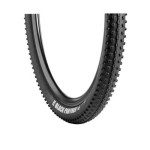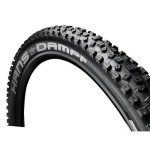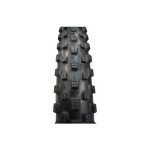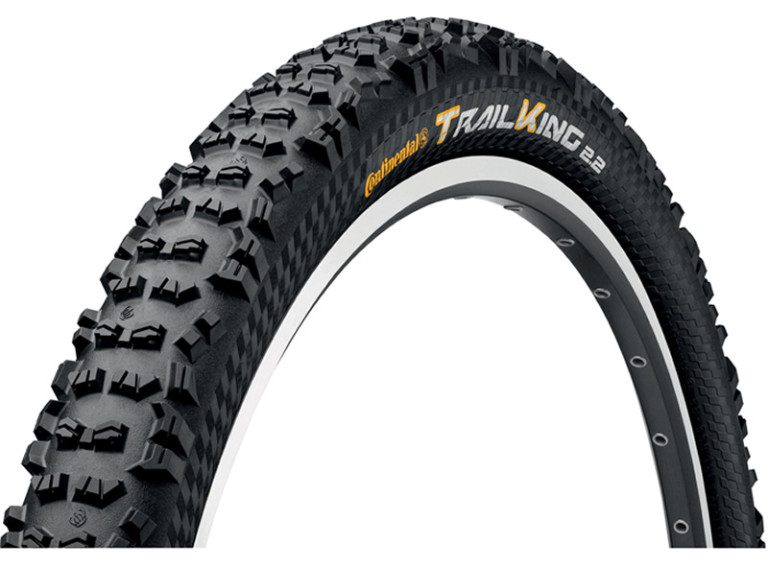You simply can’t have too many tyres. Any mountain biker worth their salt should have a pile about waist high somewhere in their house. But what sort of tyres should your wheels be wearing when there’s leaves on your line?
Here’s our run-down of some excellent Autumnal rubber. We have something for all wheel sizes – 26in, 27.5 and 29er.
Tempting as it is to split your year into just two seasons – summer and winter – there is a definite advantage to be had in recognising that Autumn has its own specific qualities and problems.
If you keep your Summer treads on they’ll struggle in the fallen leaves and general trail mulch that abounds in September and October. If you switch straight to your full-on Winter tyres they’ll be narrow and harsh and draggy.
Essentially Autumn is like a diet Winter. A toned down version of the filth and dank that is yet to properly appear. The temperatures are still okay. There’s still a decent amount of daylight hours around. And the ground is fundamentally still firm from its baking over the Summer.
There will be puddles and mucky bits around – this is the UK after all – but usually we don’t see the deep boggy stuff appearing just yet. So in this regard there’s no need to fit narrower tyres than those that you’ve been using over Summer.
Knobs, shoulders and sticky stuff
 What you will need to contemplate is adding a bit of oomph to your knobbles. A tread with taller knobs and knobs that are more spaced out. The spacey-ness does two things: it helps the knobbles punch through to find traction and it helps the tyre to fling off mud ie prevents your tyre from packing up with mud.
What you will need to contemplate is adding a bit of oomph to your knobbles. A tread with taller knobs and knobs that are more spaced out. The spacey-ness does two things: it helps the knobbles punch through to find traction and it helps the tyre to fling off mud ie prevents your tyre from packing up with mud.
Another factor to look out for is a tyre that has a bit more of pronounced shoulder to them. More square in profile than round. Having more aggressive shoulder tread helps find traction when cornering or traversing across cambered trails. There’s minimal extra drag penalty too – especially if you choose to only run a square-shouldered tyre up front, which is where most of the work is required.
If your terrain involves a decent amount of rocks and roots then opting for a softer compound tyre will significantly improve your confidence and capability. Softer tyres can be draggier so we’d recommend just running soft tyres on the front and having the rear tyre as standard/firm compound for easier rolling.
Hitting slippery root and rocks with a soft, sticky front tyre makes the difference between staying upright or careering into the undergrowth.
A nother tip for firm but slippery terrain is to look for knobbles that have slices or X-cuts on the top. These cuts are called sipes and they help the tyre to find traction by splaying out upon contact
nother tip for firm but slippery terrain is to look for knobbles that have slices or X-cuts on the top. These cuts are called sipes and they help the tyre to find traction by splaying out upon contact
It can sometimes be difficult to work out what rubber compound a tyre is made from. Generally mountain bikes vary between 4oa and 70a durometer (durometer is the scientific way of categorising a rubber’s stickyness).
40a tyres are very soft and sticky. 70a tyres are hard. Sometimes though tyre companies don’t describe their compounds in durometer numbers. They use proprietary names instead.
Different rubber compounds explained
- Maxxis Super Tacky = 42a, sticky.
- Maxxis Dual Compound = centre tread is 70a (hard), shoulder tread is 60a (normal).
- Maxxis 3C = three layers of different compound rubbers, available in 3 combinations (see below). The base layer is always a very firm, stiff rubber and the two layers on top of this are progressively softer. The idea is to create a grippy tyre that doesn’t squirm around or drag as much as a single compound soft tyre.
- Maxxis 3C Maxx Terra = 70a base, 50a centre, 42a shoulders.
- Maxxis 3C Maxx Speed = Maxxis haven’t released the durometer info but we’d guess that it’s 70a base, 60a centre and 50a shoulders.
- Maxxis 3C Maxx Grip = Again Maxxis don’t release the exact info but we’d guess that it’s 70a base, 42a centre and 40a shoulders
- Schwalbe PaceStar = Schwalbe don’t release the durometer info. Suffice to say though, PaceStar is the hardest compound.
- Schwalbe TrailStar = No exact info from Schwalbe but TrailStar is their intermediate/normal compound.
- Schwalbe VertStar = No exact info again but VertStar is Schwalbe’s softest compound.
- Continental Black Chilli = Unhelpfully, not all Black Chilli rubber is the same. All Black Chilli tyres are significantly stickier than Continental’s non-Black Chilli tyres. Generally the size of the tyre influences the durometer of the Black Chilli compound used ie fatter tyres get the stickier Black Chilli compound.
- Panaracer ZSG Natural = 65a, hard.
If you know the exact durometers of any of the ‘mystery’ terms listed above – please comment below. We’re dying to know ourselves!
Which MTB tyres should you buy for Autumn?
 Leisure riders should look for a keenly-priced tyre with a gappier than normal tread pattern. Don’t fret about tyre compounds.
Leisure riders should look for a keenly-priced tyre with a gappier than normal tread pattern. Don’t fret about tyre compounds.
Regular riders should go for a soft (42-50a) square shoulder front tyre and a fimer (60a), rounder shoulder rear tyre. Try to keep the tread very open and spacey all over at the front. A less-spaced out centre strip of knobbles on the rear is no problem – and it keeps the tyre rolling fast.
Racers should go for the same sort of tyres as regular riders (see above) but you should look for tubeless compatible versions and you may wish to go for a more supple high-TPI (threads per inch) carcass to save a bit of weight at the expense of a bit of sturdiness and pinch protection.

